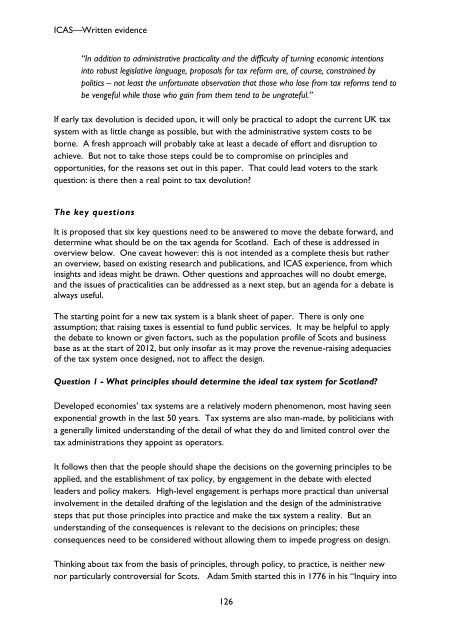SELECT COMMITTEE ON ECONOMIC AFFAIRS - Parliament
SELECT COMMITTEE ON ECONOMIC AFFAIRS - Parliament
SELECT COMMITTEE ON ECONOMIC AFFAIRS - Parliament
You also want an ePaper? Increase the reach of your titles
YUMPU automatically turns print PDFs into web optimized ePapers that Google loves.
ICAS—Written evidence<br />
“In addition to administrative practicality and the difficulty of turning economic intentions<br />
into robust legislative language, proposals for tax reform are, of course, constrained by<br />
politics – not least the unfortunate observation that those who lose from tax reforms tend to<br />
be vengeful while those who gain from them tend to be ungrateful.”<br />
If early tax devolution is decided upon, it will only be practical to adopt the current UK tax<br />
system with as little change as possible, but with the administrative system costs to be<br />
borne. A fresh approach will probably take at least a decade of effort and disruption to<br />
achieve. But not to take those steps could be to compromise on principles and<br />
opportunities, for the reasons set out in this paper. That could lead voters to the stark<br />
question: is there then a real point to tax devolution?<br />
The key questions<br />
It is proposed that six key questions need to be answered to move the debate forward, and<br />
determine what should be on the tax agenda for Scotland. Each of these is addressed in<br />
overview below. One caveat however: this is not intended as a complete thesis but rather<br />
an overview, based on existing research and publications, and ICAS experience, from which<br />
insights and ideas might be drawn. Other questions and approaches will no doubt emerge,<br />
and the issues of practicalities can be addressed as a next step, but an agenda for a debate is<br />
always useful.<br />
The starting point for a new tax system is a blank sheet of paper. There is only one<br />
assumption; that raising taxes is essential to fund public services. It may be helpful to apply<br />
the debate to known or given factors, such as the population profile of Scots and business<br />
base as at the start of 2012, but only insofar as it may prove the revenue-raising adequacies<br />
of the tax system once designed, not to affect the design.<br />
Question 1 - What principles should determine the ideal tax system for Scotland?<br />
Developed economies’ tax systems are a relatively modern phenomenon, most having seen<br />
exponential growth in the last 50 years. Tax systems are also man-made, by politicians with<br />
a generally limited understanding of the detail of what they do and limited control over the<br />
tax administrations they appoint as operators.<br />
It follows then that the people should shape the decisions on the governing principles to be<br />
applied, and the establishment of tax policy, by engagement in the debate with elected<br />
leaders and policy makers. High-level engagement is perhaps more practical than universal<br />
involvement in the detailed drafting of the legislation and the design of the administrative<br />
steps that put those principles into practice and make the tax system a reality. But an<br />
understanding of the consequences is relevant to the decisions on principles; these<br />
consequences need to be considered without allowing them to impede progress on design.<br />
Thinking about tax from the basis of principles, through policy, to practice, is neither new<br />
nor particularly controversial for Scots. Adam Smith started this in 1776 in his “Inquiry into<br />
126

















